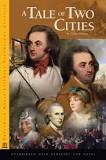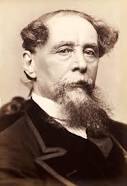A Tale of Two Cities Page #2
A Tale of Two Cities is a historical novel by Charles Dickens, set in London and Paris before and during the French Revolution.
There was a steaming mist in all the hollows, and it had roamed in its forlornness up the hill, like an evil spirit, seeking rest and finding none. A clammy and intensely cold mist, it made its slow way through the air in ripples that visibly followed and overspread one another, as the waves of an unwholesome sea might do. It was dense enough to shut out everything from the light of the coach-lamps but these its own workings, and a few yards of road; and the reek of the labouring horses steamed into it, as if they had made it all. Two other passengers, besides the one, were plodding up the hill by the side of the mail. All three were wrapped to the cheekbones and over the ears, and wore jack-boots. Not one of the three could have said, from anything he saw, what either of the other two was like; and each was hidden under almost as many wrappers from the eyes of the mind, as from the eyes of the body, of his two companions. In those days, travellers were very shy of being confidential on a short notice, for anybody on the road might be a robber or in league with robbers. As to the latter, when every posting-house and ale-house could produce somebody in “the Captain's” pay, ranging from the landlord to the lowest stable non-descript, it was the likeliest thing upon the cards. So the guard of the Dover mail thought to himself, that Friday night in November, one thousand seven hundred and seventy-five, lumbering up Shooter's Hill, as he stood on his own particular perch behind the mail, beating his feet, and keeping an eye and a hand on the arm-chest before him, where a loaded blunderbuss lay at the top of six or eight loaded horse-pistols, deposited on a substratum of cutlass. The Dover mail was in its usual genial position that the guard suspected the passengers, the passengers suspected one another and the guard, they all suspected everybody else, and the coachman was sure of nothing but the horses; as to which cattle he could with a clear conscience have taken his oath on the two Testaments that they were not fit for the journey. “Wo-ho!” said the coachman. “So, then! One more pull and you're at the top and be damned to you, for I have had trouble enough to get you to it!--Joe!” “Halloa!” the guard replied. “What o'clock do you make it, Joe?” “Ten minutes, good, past eleven.” “My blood!” ejaculated the vexed coachman, “and not atop of Shooter's yet! Tst! Yah! Get on with you!” The emphatic horse, cut short by the whip in a most decided negative, made a decided scramble for it, and the three other horses followed suit. Once more, the Dover mail struggled on, with the jack-boots of its passengers squashing along by its side. They had stopped when the coach stopped, and they kept close company with it. If any one of the three had had the hardihood to propose to another to walk on a little ahead into the mist and darkness, he would have put himself in a fair way of getting shot instantly as a highwayman. The last burst carried the mail to the summit of the hill. The horses stopped to breathe again, and the guard got down to skid the wheel for the descent, and open the coach-door to let the passengers in. “Tst! Joe!” cried the coachman in a warning voice, looking down from his box. “What do you say, Tom?” They both listened. “I say a horse at a canter coming up, Joe.” “I say a horse at a gallop, Tom,” returned the guard, leaving his hold of the door, and mounting nimbly to his place. “Gentlemen! In the king's name, all of you!” With this hurried adjuration, he cocked his blunderbuss, and stood on the offensive. The passenger booked by this history, was on the coach-step, getting in; the two other passengers were close behind him, and about to follow. He remained on the step, half in the coach and half out of; they remained in the road below him. They all looked from the coachman to the guard, and from the guard to the coachman, and listened. The coachman looked back and the guard looked back, and even the emphatic leader pricked up his ears and looked back, without contradicting. The stillness consequent on the cessation of the rumbling and labouring of the coach, added to the stillness of the night, made it very quiet indeed. The panting of the horses communicated a tremulous motion to the coach, as if it were in a state of agitation. The hearts of the passengers beat loud enough perhaps to be heard; but at any rate, the quiet pause was audibly expressive of people out of breath, and holding the breath, and having the pulses quickened by expectation. The sound of a horse at a gallop came fast and furiously up the hill. “So-ho!” the guard sang out, as loud as he could roar. “Yo there! Stand! I shall fire!” The pace was suddenly checked, and, with much splashing and floundering, a man's voice called from the mist, “Is that the Dover mail?” “Never you mind what it is!” the guard retorted. “What are you?” “Is that the Dover mail?” “Why do you want to know?” “I want a passenger, if it is.” “What passenger?” “Mr. Jarvis Lorry.” Our booked passenger showed in a moment that it was his name. The guard, the coachman, and the two other passengers eyed him distrustfully. “Keep where you are,” the guard called to the voice in the mist, “because, if I should make a mistake, it could never be set right in your lifetime. Gentleman of the name of Lorry answer straight.” “What is the matter?” asked the passenger, then, with mildly quavering speech. “Who wants me? Is it Jerry?” (“I don't like Jerry's voice, if it is Jerry,” growled the guard to himself. “He's hoarser than suits me, is Jerry.”) “Yes, Mr. Lorry.” “What is the matter?” “A despatch sent after you from over yonder. T. and Co.” “I know this messenger, guard,” said Mr. Lorry, getting down into the road--assisted from behind more swiftly than politely by the other two passengers, who immediately scrambled into the coach, shut the door, and pulled up the window. “He may come close; there's nothing wrong.” “I hope there ain't, but I can't make so 'Nation sure of that,” said the guard, in gruff soliloquy. “Hallo you!” “Well! And hallo you!” said Jerry, more hoarsely than before. “Come on at a footpace! d'ye mind me? And if you've got holsters to that saddle o' yourn, don't let me see your hand go nigh 'em. For I'm a devil at a quick mistake, and when I make one it takes the form of Lead. So now let's look at you.” The figures of a horse and rider came slowly through the eddying mist, and came to the side of the mail, where the passenger stood. The rider stooped, and, casting up his eyes at the guard, handed the passenger a small folded paper. The rider's horse was blown, and both horse and rider were covered with mud, from the hoofs of the horse to the hat of the man.
Translation
Translate and read this book in other languages:
Select another language:
- - Select -
- 简体中文 (Chinese - Simplified)
- 繁體中文 (Chinese - Traditional)
- Español (Spanish)
- Esperanto (Esperanto)
- 日本語 (Japanese)
- Português (Portuguese)
- Deutsch (German)
- العربية (Arabic)
- Français (French)
- Русский (Russian)
- ಕನ್ನಡ (Kannada)
- 한국어 (Korean)
- עברית (Hebrew)
- Gaeilge (Irish)
- Українська (Ukrainian)
- اردو (Urdu)
- Magyar (Hungarian)
- मानक हिन्दी (Hindi)
- Indonesia (Indonesian)
- Italiano (Italian)
- தமிழ் (Tamil)
- Türkçe (Turkish)
- తెలుగు (Telugu)
- ภาษาไทย (Thai)
- Tiếng Việt (Vietnamese)
- Čeština (Czech)
- Polski (Polish)
- Bahasa Indonesia (Indonesian)
- Românește (Romanian)
- Nederlands (Dutch)
- Ελληνικά (Greek)
- Latinum (Latin)
- Svenska (Swedish)
- Dansk (Danish)
- Suomi (Finnish)
- فارسی (Persian)
- ייִדיש (Yiddish)
- հայերեն (Armenian)
- Norsk (Norwegian)
- English (English)
Citation
Use the citation below to add this book to your bibliography:
Style:MLAChicagoAPA
"A Tale of Two Cities Books." Literature.com. STANDS4 LLC, 2024. Web. 21 Dec. 2024. <https://www.literature.com/book/a_tale_of_two_cities_19>.




Discuss this A Tale of Two Cities book with the community:
Report Comment
We're doing our best to make sure our content is useful, accurate and safe.
If by any chance you spot an inappropriate comment while navigating through our website please use this form to let us know, and we'll take care of it shortly.
Attachment
You need to be logged in to favorite.
Log In